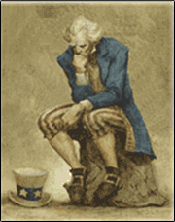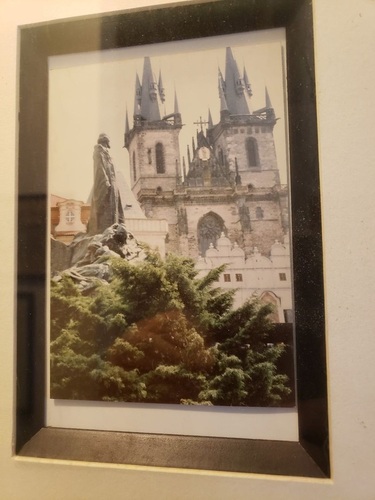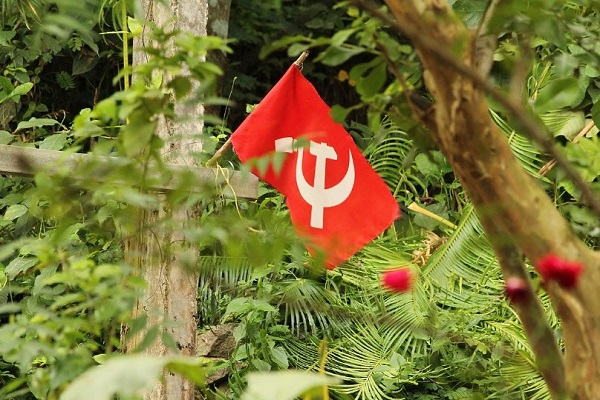
–>
July 16, 2023
One of the 20th century’s great writers died on July 11.
‘); googletag.cmd.push(function () { googletag.display(‘div-gpt-ad-1609268089992-0’); }); document.write(”); googletag.cmd.push(function() { googletag.pubads().addEventListener(‘slotRenderEnded’, function(event) { if (event.slot.getSlotElementId() == “div-hre-Americanthinker—New-3028”) { googletag.display(“div-hre-Americanthinker—New-3028”); } }); }); }
In these addled and busy times, he seemed to have become a voice of the past. During his active years, he very much was a voice of the “present,” a literary prism through which the crises of the age were illuminated, if not solved. He remains, however, a voice of and for the future.
As the times are addled, so is Kundera’s legacy, or rather the general perception of his work. As a onetime member of the Czechoslovak Communist Party, then a dissenter and dissident, twice stripped of party membership, then exiled, his works banned in his homeland, and a voice against totalitarian tyranny, he would seem to be secure in the pantheon of literary rebels like Franz Kafka, Arthur Koestler, Eugene Lyons, Whitaker Chambers, Elizabeth Bentley, and Aleksandr Solzhenitsyn.
But while Kundera clearly retained no affection for communism, the pervasive anti-totalitarian subtexts of his work were less specific, less political, and more philosophical. Perhaps most like his countryman Kafka among that pantheon of the 20th century’s lonely freedom fighters, Kundera identified and criticized the type of totalitarian mindset that is more insidious than the statist mentality of Marxism: the banal but incessant downward pressure of societies; the insistence on low expectations and lower ambitions; the denial of rights masquerading as the assertion of rights; the morphology of low standards to no standards.
‘); googletag.cmd.push(function () { googletag.display(‘div-gpt-ad-1609270365559-0’); }); document.write(”); googletag.cmd.push(function() { googletag.pubads().addEventListener(‘slotRenderEnded’, function(event) { if (event.slot.getSlotElementId() == “div-hre-Americanthinker—New-3035”) { googletag.display(“div-hre-Americanthinker—New-3035”); } }); }); }
Kundera, after some celebration from the 1960s to the ’80s as a brave survivor and voice of protest, slid into seclusion and self-imposed exile in France. Like Solzhenitsyn, he escaped oppression, arrests, and censorship, only to find himself in a different sort of prison: the materialistic West’s diffidence.
The fate of artists who assert the freedom of conscience and expression under communism became “non-persons.” In the West, most of them became free to be ignored, denied, sometimes ridiculed — non-persons of a different sort, in prisons without bars.
As totalitarian mindsets overtake the world and our own morally flaccid culture, Milan Kundera, however, remains a prophet — different in focus and in literary style from those predecessors, except for being largely unheeded. That literary style, by itself, was unique, but his critiques were fashioned in irony and ambiguity — not from timidity, at all, but to force readers to move more than halfway, not to meet him, but to confront truth. His fusillades were not frontal assaults, but attacks on the flanks of the march of totalitarianism.
Before my own first trip to Prague, to an international book fair, a friend gave me a copy of the recently published The Unbearable Lightness of Being by Kundera. It was, to me, revolutionary and, of course, perfectly timed. This was just after the “Velvet Revolution,” the overthrow of communism. I first spent a week in Sarajevo and Belgrade. Those former Yugoslav cities were dirty, grimy, depressed, broken. In the Czech Republic’s Prague, streets were clean, people were cheery, and even the closed shops somehow emitted optimism. I went to a rousing performance of the Bohemians’ national tone poem, Smetana’s Ma Vlast, attended by the new president (and former oppressed literary figure, like Kundera) Vaclav Havel, in the grand Concert Hall. It was grand, indeed.
Afterward, I read and appreciated Kundera’s landmark work The Book of Laughter and Forgetting. These and other works teach much about the individuals’ inescapable necessity to respond to totalitarian encroachments…whether brought by governments, societies, or our own life choices…the preternatural requirement to oppose national policies of betrayal and regimentation.
The Bohemians and Moravians — the thriving Czech Republic — restored citizenship, which the old communists had stripped, to Kundera. Slovakia, the other part of Czechoslovakia, which has clung to socialism, has not. His person, just as his beliefs, are foreign to that portion of his old homeland. Even after adopting French citizenship, Kundera had for years struggled with the meaning — and, in many lands, the absence of meaning — of home. “Forgetting” and “home” are words — concepts — with numerous implications that pervade his work.
‘); googletag.cmd.push(function () { googletag.display(‘div-gpt-ad-1609268078422-0’); }); document.write(”); googletag.cmd.push(function() { googletag.pubads().addEventListener(‘slotRenderEnded’, function(event) { if (event.slot.getSlotElementId() == “div-hre-Americanthinker—New-3027”) { googletag.display(“div-hre-Americanthinker—New-3027”); } }); }); } if (publir_show_ads) { document.write(“
Kundera as a prophet? I think his more personal attentions resulted in messages that speak more personally. His first novel, The Joke, is a virtual blueprint, act by act, of what today is called Cancel Culture. It was written in 1967. And how Tomas in The Incredible Lightness of Being is canceled, too — “blacklisting,” a previous generation termed it — however, not over politics, but over one group’s view of an individual’s behavior. Today’s New Puritanism, totalitarian in purpose and practice, has broadened from its parochial and partisan roots today and become national policy.
Much of 19th- and 20th-century literature grows from man-against-the-state critiques, even while Karl Marx was a mere glint in his parents’ eyes. Thackeray and especially Dickens frequently portrayed a type of social totalitarianism — certainly authoritarianism. Earlier, Jane Austen’s settings are woman-against-the-system — almost as brutal, but of a “tea, lace, and perfume” sort.
To the extent, and it was a great extent, that Kundera shrugged instead of fought, sighed instead of screamed, his work strongly suggested that much of contemporary life — above and beyond bureaucratic socialist states — is futile, or at least that mankind’s opposition might be futile. As such, he constructed stories and characters that were ironic, inconsistent, capricious, and very ambiguous.
I share here a photo framed on my wall, one I took in the Old Town Square during that trip to Prague. It memorializes the burning at the stake of Jan Hus, more than 700 years ago — an early fighter, prefiguring Milan Kundera, for freedom of conscience.

Image: Rick Marschall, used with permission.
The battles for freedom of thought, there, here, and worldwide, yet rage.
In the realm of totalitarian kitsch, all answers are given in advance and preclude any questions.
—Milan Kundera

Image: Praveenp via Wikimedia Commons, CC BY-SA 4.0 (cropped).
<!–
–>
<!– if(page_width_onload <= 479) { document.write("
“); googletag.cmd.push(function() { googletag.display(‘div-gpt-ad-1345489840937-4’); }); } –> If you experience technical problems, please write to [email protected]
FOLLOW US ON
<!–
–>
<!– _qoptions={ qacct:”p-9bKF-NgTuSFM6″ }; ![]() –> <!—-> <!– var addthis_share = { email_template: “new_template” } –>
–> <!—-> <!– var addthis_share = { email_template: “new_template” } –>





